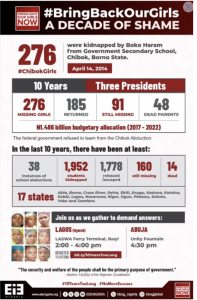School Kidnapping in Nigeria – An Analysis
School Kidnapping in Nigeria
Following the recent 10 year anniversary of the April 2014 abduction of 276 schoolgirls from a secondary school in Chibok in Nigeria’s northeastern state of Borno, we look into what has continued to be an ever present threat in certain parts of the country. As at 14/15th April 2024, 10 years since the abduction took place, it is believed 91 of the girls are still missing.
70 further attacks have targeted schools in the country since that day, primarily in the north of the country.
Of these attacks:
- 49 have occurred in the North-Western and 11 in the north-Central geopolitical zones.
- More than 1,680 children have been abducted from schools.
- According to Amnesty International, 780 children were abducted in 2021. Bring Back Our Girls puts the numbers even higher (see the image of their poster below).
- Additionally,180 pupils have been killed and 90 injured.
- 60 school staff were also kidnapped and 14 killed.
- 25 school building were also destroyed in these attacks.
In the first 3 months of 2024, 309 students have been abducted:
- 29 January 2024, 5 students 3 teachers and a driver abducted, Emure, Ekiti State
- 07 March 2024, 100 primary school pupils and 187 secondary school pupils abducted, Chiruga Community, Chikun LGA, Kaduna State.
- 09 March 2024, 17 students abducted, Gada, Sokoto State
At the time of writing, it is believed most of these 309 have been released or rescued however the ongoing threat and fear of these incidents has a huge ongoing impact:
- Hundreds of schools remain closed.
- Pupil numbers are falling as parents lose faith in state and federal security forces.
- School dropout rates are increasing in a country where millions already do not attend school.
- UNICEF says 10.5 million Nigerian children never attend school – 20% of the global total for children who never receive an education.
- Traumatisation of pupils that survive attacks / captivity is profound.
Girls are most at risk of dropping out of school. They are frequently targeted by groups seeking young women as brides. According to Girls Not Brides, an organisation working to end child marriage, the problem is most common in Nigeria’s northwestern and northeastern areas, where just over half of women aged 20-24 marry before their adulthood.

What Drives Mass Abduction of School Children?
Nigeria’s security landscape presents significant challenges, particularly in the North-West region where armed groups, often referred to as ‘bandits’, operate with impunity. These groups, backed by influential individuals seeking a share of their profits, pose a formidable threat to stability.
Mass abductions, especially in northern Nigeria, highlight the poor security measures in schools. Despite international outcry following incidents like the Chibok kidnapping, little progress has been made in enhancing school security. While the Federal Government ratified the Safe Schools Declaration in 2015 and allocated $14 million for projects in the North-East, implementation remains limited at the state and local government levels.
Bandits’ mobility and rapid manoeuvres make them elusive targets for security forces, whose centralized command structures hinder swift and effective responses to security crises. In the North-East, Islamist terrorists have targeted schools, opposing Western-style education and the education of women.
In the North-West, mass abductions have become lucrative ventures, with reported ransom demands reaching exorbitant amounts. Despite ransom payments being a federal crime, suspicions arise regarding their payment, as seen in the Kuriga abduction case, where security forces intervened just before the ransom deadline.
Mass kidnap for ransom finances other activities – frequently terrorism or political activity. It is also driven by greed or financial hardship. In November 2022, according to Federal Government statistics, an estimated 63% of the population was caught in multidimensional poverty, and 72% in rural areas and with the current economic climate, this is only worsening.
Will Anything Change?
There are several factors impacting the ability, or desire, to fully focus on this issue:
- Nigerian Security forces are overstretched and suffer crippling organisational weaknesses that prevent them from pre-empting attacks.
- Terrorists and criminals retain the initiative and consistently elude security forces.
Failure to effectively implement the Safe Schools Declaration does not bode well. However, ultimately the solution must be political rather than a military one.
Only the emergence of a prosperous society with good employment opportunities will improve what is currently a very permissive environment for the criminals. The educational deficit, exacerbated by the effects of mass school abductions, act as a brake on that progress. Even with a fully educated youth, the emergence of a stable and prosperous society is likely to take years to achieve. With Nigeria’s population expected to exceed 260million in the next 5 years, and with half of the current population being under 19 years old, education and prospects for this generation will have a huge impact on not only the country’s future, but possibly more far-reaching. We will continue to monitor and provide commentary and analysis on this continuing situation.

